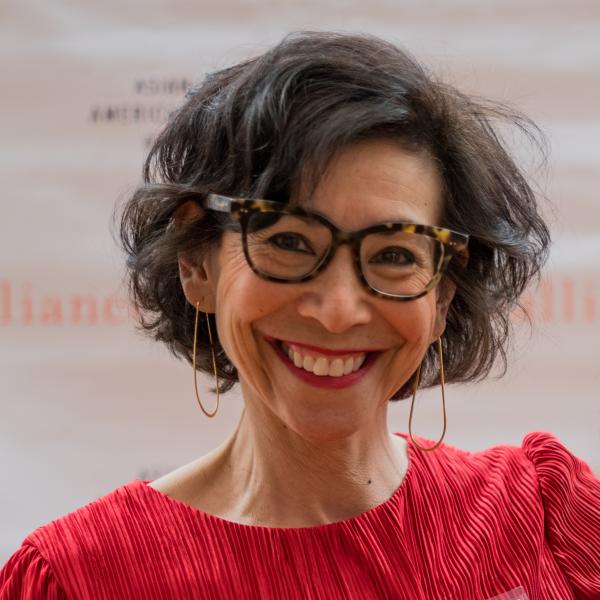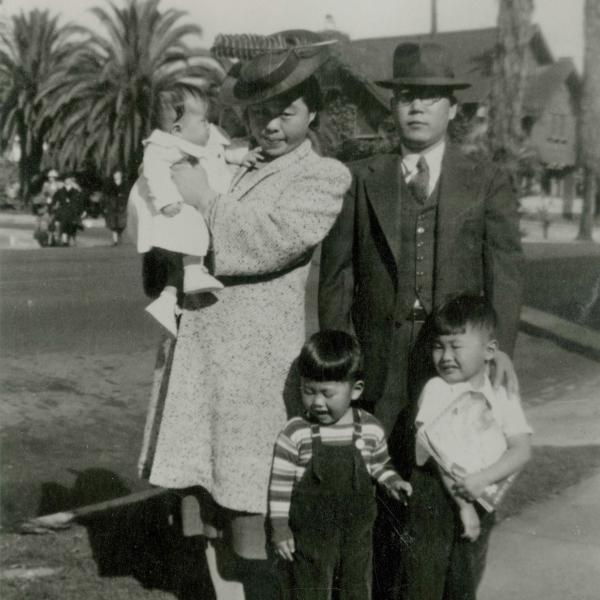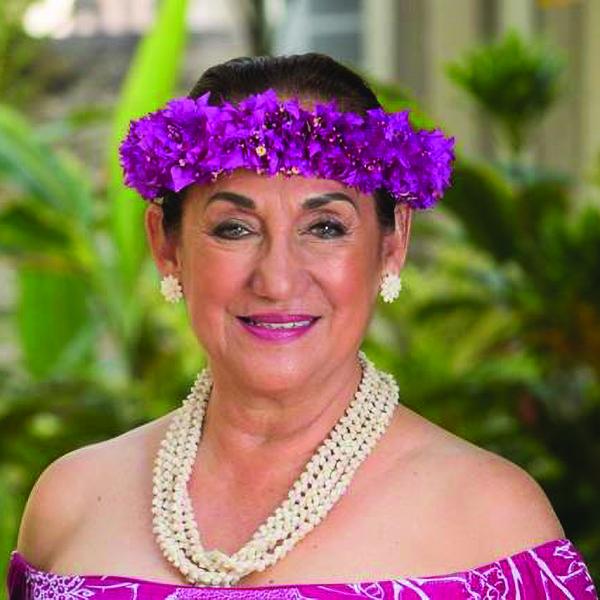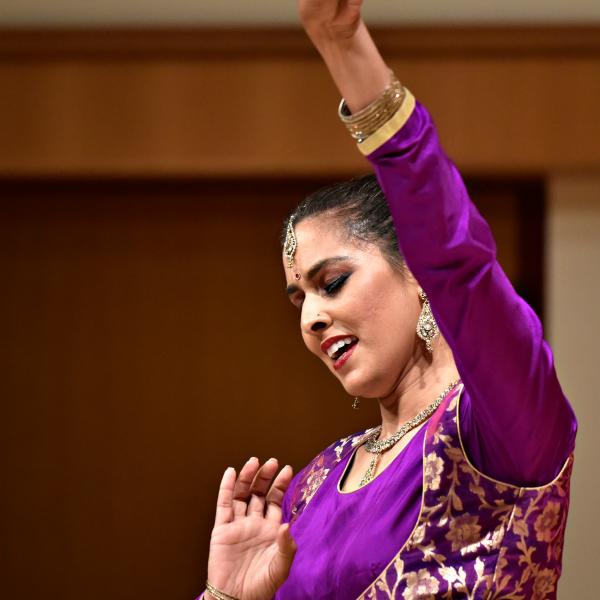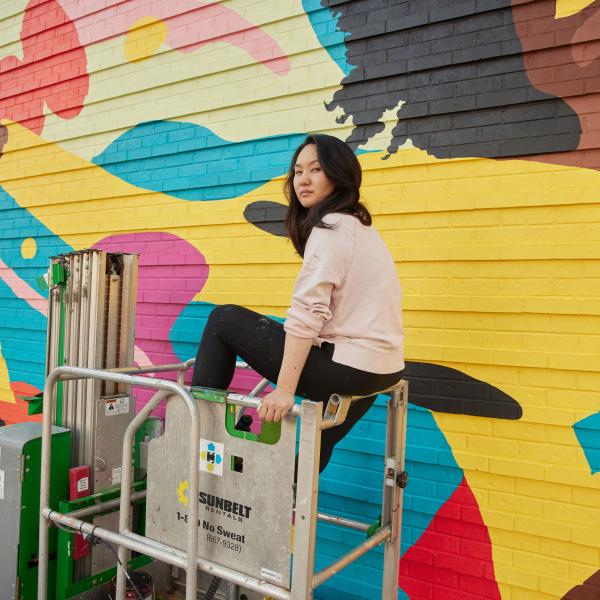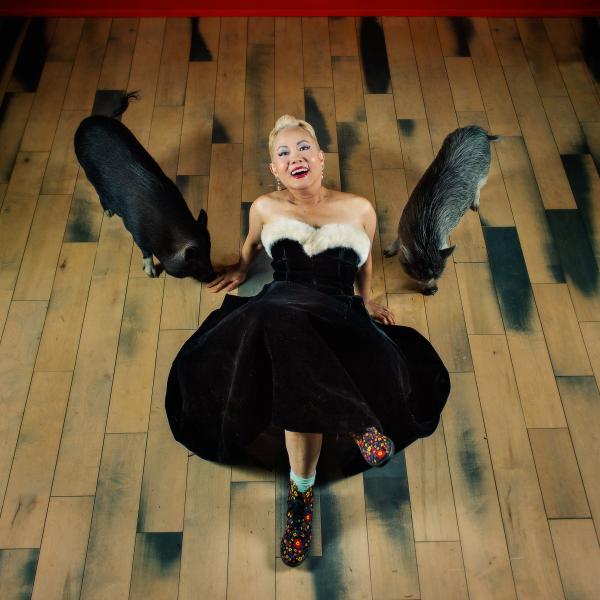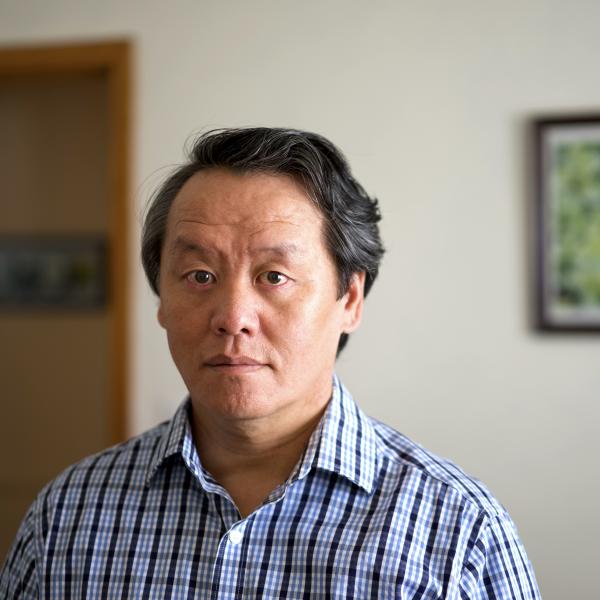A New, Fresh Light on Asian American Stories
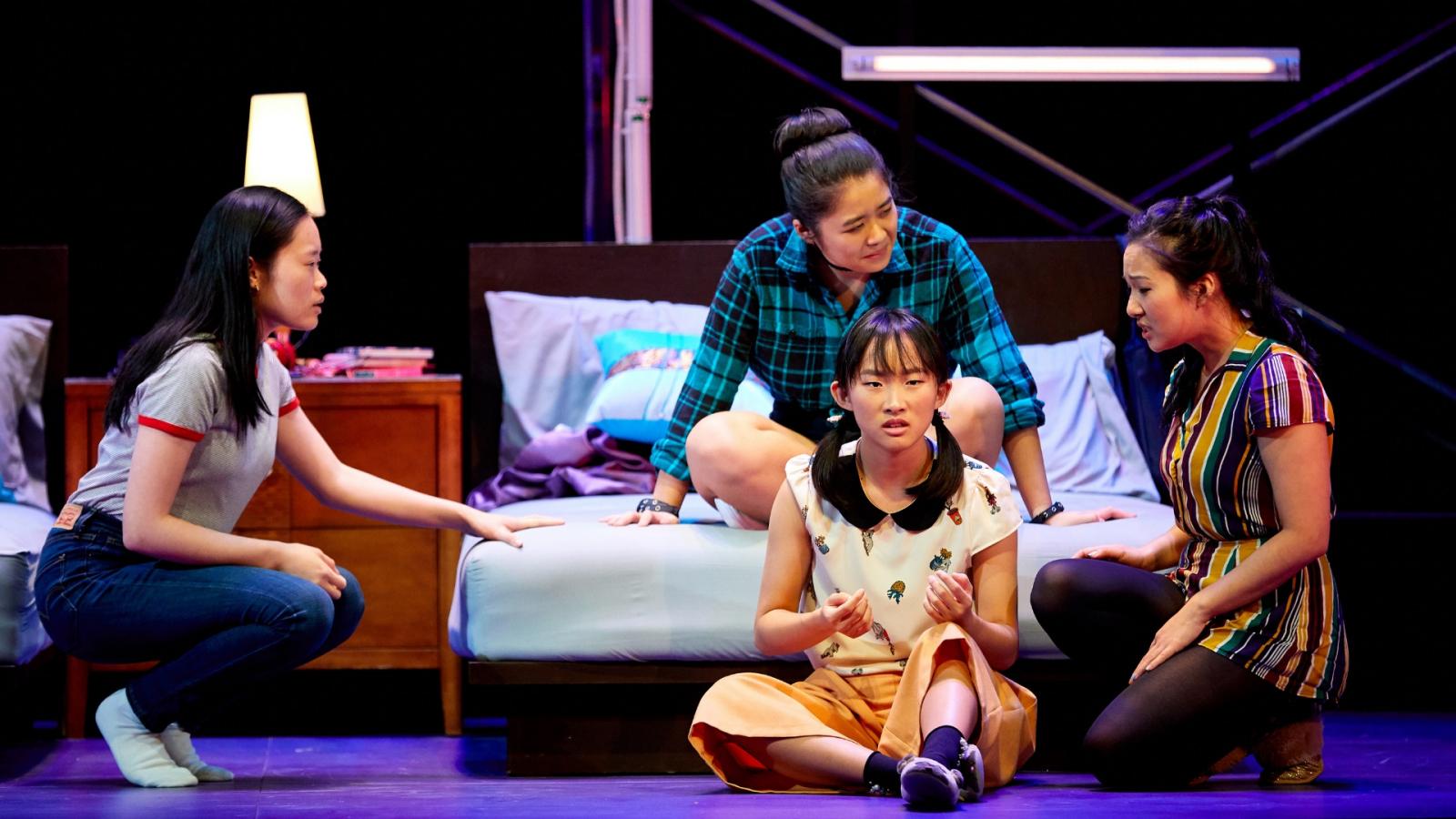
East West Players' production of Anna Moench's Man of God (2019). Photo by Idris Ademola
East West Players in Los Angeles, California, is one of the longest running theaters of color, and it is now the nation’s leading Asian American theater company. It has debuted hundreds of plays and more than a thousand readings and workshops for actors, directors, and writers, raising the visibility of the Asian American experience.
Producing artistic director of East West Players Snehal Desai talks with the NEA about the significance of the company’s founding mission of advocating for racial justice through transformative theater.
Snehal Desai: I just saw a study that was released that said 50 percent of roles that Asian Americans are cast in in Hollywood and TV and film tend to be either sidekick or stereotypical roles or roles where they're kind of the brunt of the jokes. And that's still happening today, and East West Players was founded to break outside of those molds.
Jo Reed: That is the artistic director of East West Players Snehal Desai, and this is the online edition of American Artscape. I’m Josephine Reed. As we’ve learned, and re-learned, stereotypes and erasures in books, on screens and on stages have real-world consequences. East-West Players has been fighting these erasures and stereotypes since the mid-1960s by raising the visibility of the Asian American experience through theater. East West Players is one of the longest running theaters of color and it is now the nation’s leading Asian American theater company. It has debuted hundreds of plays and over a thousand readings and workshops for actors, directors, and writers. Its mission is to inspire and advocate for a world free of racism and discrimination through transformative theater. Artistic director of East West Players Snehal Desai explains
Snehal Desai: East West Players was started in 1965 by a group of nine artists, you know, and they were actors and writers and directors here in LA. And they, you know, working in TV and film and having a passion for theater, and really, the founding of East West Players came out of two things. One was the opportunity to play roles that Asian American actors are traditionally excluded from. So to cast themselves in Shakespeare and to be in Brecht plays and to be in leading roles where oftentimes in Hollywood they're relegated to kind of sidekick roles. And then the second was the opportunity for Asian American artists to tell Asian American stories.
Jo Reed: As the artistic director, it's your job to program a season and I'm wondering how you weigh these two missions that you have of telling Asian American stories and also presenting more traditional classic theater.
Snehal Desai: You know, it's definitely a balancing act. And I think more and more we are leaning towards or tipping the scale, if you will, towards Asian American stories by Asian American artists. So as great as it is to program those classics or, you know, or well-known kind of mainstream plays and cast them with Asian American actors, you know, it still is lifting up the Western canon. And the Western canon has traditionally been a colonial canon as we know and been exclusionary to Asian American stories. And so I think more and more that is where the push has been but, you know, when we do musicals, that is where we have been, you know, we've done everything from "Mamma Mia!" to "Next to Normal" to, you know, we're hoping to bring back a production of "Assassins" by Sondheim, which closed at the beginning of the pandemic. And so, you know, we balance it with things that are recognizable and known in those ways, but we can provide a new fresh light on with new stories by Asian Americans. And particularly what's interesting is now as Asian American households become multigenerational and as Asian American families have been here for generations the stories are changing and evolving, and so I think that's what's very interesting and that's what I want to makes sure we're-- we continue to program.
Jo Reed: Right. It's not just your immigrant story anymore, as interesting as that is, it's much more complex than that now.
Snehal Desai: Exactly, exactly. So many of the stories initially had been kind of first generation stories, right. And I say this jokingly, but they've been, often been about immigrant households where, you know, there's a fracturing among the generations and then there's a ghost.
<laughter>
Snehal Desai: And that's become a little bit of a trope. But we've been able to move beyond that and I think tell other stories.
Jo Reed: <laughs> Before we move on with that, there are other defining characteristics to East West. And a great accomplishment. You have your own theater.
Snehal Desai: Exactly. So we are one of the longest running theaters of color and then, you know, it's both something we're very proud of and also something that I think, you know, is very telling about the theatrical scene is that we're the only Asian American theater in the whole country with its own dedicated space.
Jo Reed: And that is a very big deal. And many, many congratulations for that. And the other thing is it's not unusual for you to work with other theaters throughout the country to do co-productions, for example.
Snehal Desai: Yeah, very much so. It allows us to play with, you know, the canvas, if you will, that we paint on, that our artists paint on. So we're through partnerships, we're able to work in smaller and larger venues. So we worked with the Center Theater Group on the world premiere of "Soft Power," which was by David Henry Hwang and Jeanine Tesori and that was done in the beautiful Ahmanson, which is a 2,000-plus seat theater. And then we have done the Los Angeles premiere of "Allegiance" with George Takei, which was with the Japanese American Cultural Community Center. And then we've done site-specific stuff. And I think it's both about helping to connect these companies and their audiences and communities with Asian American stories, but it also allows us to branch out from our home and location in Little Tokyo to other parts of the city.
Jo Reed: And you also partner with social justice organizations when you present work.
Snehal Desai: Exactly. Why I love East West Players and as an artist I found it as a home is that it sits at the intersection of social justice and art, you know. And those two things are inextricably linked in our founding and in our mission in terms of equity, diversity and inclusion, if you will, for API artists but artists of color. And so we have along the way partnered with other social justice organizations, whether they be the LGBT Center, Los Angeles LGBT Center or Asian Americans Advancing Justice, just because, you know, storytelling is such a powerful vehicle for change and a powerful vehicle for being able to shed light, particularly on things that are not talked about within the AAPI community. So things like mental health. Things like, you know, sexual orientation. Disability is one that we're working on. And so we're partnering with organizations that work with those communities so that we can lift up their stories and experiences.
Jo Reed: You know, when we talk about Asian Americans, this just takes in so many different peoples and cultures. Tell me about the challenges of how your organization works on being truly representative for all of these many groups.
Snehal Desai: You’re exactly right. Asian American is such a massive monolith, right. It's covering, you know, dozens of countries, many, many countries, billions of people <laughs> and so many cultures and heritages and traditions. And I think, you know, when you earlier asked about season planning, what's different for me when I'm season planning is also breaking apart the monolith so that we are, you know, I'm looking at not only the types of stories we're telling, the artists, whether there, you know, the form, but I'm also looking at the cultural tradition, so is it a Filipino American story? You know, and if we program that, do we have a Japanese-American story? And then whose story haven't we told or heard from in the diaspora? So whether it's a Hmong story or a story about the Micronesian community, you know, those are all factors that we try to take into account when programming because there's just so many different cultures and heritages that fit under that umbrella and I think the big thing is for folks to be able to see us, outside of that monolith.
Jo Reed: What frustrates you the most about the way Asian American artists are typically represented in media, on the stage?
Snehal Desai: I just saw a study that was released that said 50 percent of roles that Asian Americans are cast in in Hollywood and TV and film tend to be either sidekick or stereotypical roles or roles where they're kind of the brunt of the jokes. And that's still happening today, and East West Players was founded to break outside of those molds. And the other statistic that really sits with me today and is tied I think also to the rise in hate-- heated rhetoric against the Asian American community, is that 42 percent of Americans cannot name an Asian American. So 42 percent of folks in this country just cannot name one Asian American that comes to mind. And then next on the list is Jackie Chan and after that is Bruce Lee. So, you know, who Bruce Lee has a wonderful legacy, but he has also been gone for a few generations and folks can't think of a living Asian American. So to me, that just shows how invisible we still are.
Jo Reed: I just need to take that in for a moment. I had no idea that that was true. That's just shocking. Well, as you mentioned, here you are, East West Players, dealing with not just a pandemic but also a time of violence against Asian Americans. And it was a time where you couldn't gather. So how did East West Players respond to all this? What kind of programming were you able to do?
Snehal Desai: You know, I think the pandemic has, you know, shaken up our field in a number of ways that have been positive. I think one of the ways that it's really changed things is access, right. So now anyone with a computer and internet can access the programs of East West Players, our shows, as well as theaters throughout the country and other performing arts organizations. So I think the access has changed to us and it's allowed us to go from, you know, theater is such a local art form from having a, you know, a strong audience base here in Los Angeles in Southern California to now an international audience. So folks from the Philippines watch our crazy talented Asian episodes. And we have now a following in the Midwest and in the Northeast. And so I think the access aspect has changed things as has what our sense of time is for artistic works, right. So that online <laughs> as we know, sitting for an hour, it can be very, very challenging. But now we can tell stories in 15 minutes and in 30 minutes so that they're not in the traditional ways that we know of 2 hours with an intermission. So I think those things have been really, really great. And for us, it has been trying to bring our stories to life, you know, as best as possible through this digital medium. And I've been really interested in ways that the, you know, innovative storytelling could interact with the work that we do.
But in terms of everything that's been going on, you know, around the hate crimes against Asian Americans, I really believe in empowerment through storytelling and I really believe it is really hard to deny someone once you've heard their story and seen their face and heard their name. And so, for us, it was just about that. It was just starting to we created a series of PSAs that were just Asian American artists telling us their stories about times that they were bullied or they were attacked or kind of the things, the names that they have been called. And, you know, these are true experiences that they are sharing that we have been able to as an organization share nationally so no one can say that they haven't met an Asian American or that there isn't an opportunity for them to hear about what the experiences are for an Asian American in this day and age.
Jo Reed: And you also started a series of conversations, didn't you, called East West Wednesdays?
Snehal Desai: We did. You know I think <laughs> the other thing that has happened is we've become I like to joke that we are now East West Players Studios, right?
<laughter>
Snehal Desai: I think so many theater companies have become multimedia warehouses and so I was able to experiment with my Oprah phase and I'm proud to say I've done it and, you know, I'm ready to move forward. But East West Wednesdays was an opportunity for us to exactly that, have panel conversations or various conversations around social issues or topics that were happening at the time. So we started one, you know, with a comedic panel with Margaret Cho and a number of comedians talking about what their experiences are and how laughter can effect change to a series of conversations, a series of East West Wednesdays around racism in the API community and what it means to be an ally to the Black community. This was during the time of George Floyd and, you know, Black Lives Matter movement and all of that. And so we really wanted to move into those topics. But then we also had some fun. We had reunions from some of the previous East West Players shows, cast reunions. We brought artists back who hadn't been back for, you know, for a few years or decades and who had moved on to careers in TV and film. And then we also did this thing called Clopenings, which was about <laughs> theater productions that opened and closed on the same night during the pandemic. And so some of those productions are coming back but not all of those are and so we wanted to give those artists an opportunity to share their experiences, for designers to share images and drawings of the work that they did so that we could all still feel connected to the work, even though, you know, everyone was at home.
Jo Reed: We all know about the ongoing conversation for theater as well as other sectors and communities about the need to prioritize diversity, equity, access, inclusion in their internal practices as well as on the stage. And for East West Players, you're sort of you're at a different starting point, but I think one thing we all know about this work is it's not one and done. You know, it's ongoing work. And I'm just wondering some of the ways you continue to do this work.
Snehal Desai: Yeah. You know, and I think you nailed it. One of my <laughs> big red flags is if I go in for a conversation or a training around ED&I practices or any of that and you know, someone asks, "Well, when do we know we're done with the work?" or, "When do we know we have accomplished it?" And to me, because the work is never done and what it means for you to engage in this work is to create a system and apparatus where you are constantly reevaluating who is not at the table, whose voice has been marginalized, who has not been welcomed into your space? What does it mean to be an inclusive and safe space for those who have been marginalized? And so for us all of that is just baked into our mission as it has been for so many theaters of color and culturally-specific institutions. And for me, it just means two things. One, you know, if we are going to do this advocacy work, for us to model the behavior that we talk about, right, so that we practice those things that we are hoping our colleagues in other institutions will also incorporate into their organization. And so it's been very important that we make sure that we continue to expand the tent of who we are as an organization, that we are diverse. And I think that's the future, right? As we become multi-racial households, none of check off any one box in our life, right? I don't check off being Asian American and prioritize that over being LGBT, right. Or gender or, you know, culture or heritage. And so for me, it's about creating a space that is inclusive of all aspects of who you are. And I think that is what we continue to try to do at East West Players. And a lot of that just means you have to create-- be ready for those hard conversations. You have to be open to feedback and listening from other folks. And you have to constantly be asking yourself, you know, as an organization, who is not here? You know, who would we like to be with us and why aren't they here? What are the practices that have contributed to them or their community not coming to East West Players and what can we do about that?
Jo Reed: Okay, here's the self-serving question. <laughs> And that has, how has funding from the National Endowment for the Arts helped support the work of East West Players over the years?
Snehal Desai: The National Endowment for the Arts has been so generous and we are so grateful for the support. And the thing that I love about NEA support is two things. One is that we're able to apply for project-specific funding, which is actually hard to do in this day and age, right. So that we're able to apply for support for various productions or for development of a work is something that is really, really key. And, you know, and we are very grateful that during the pandemic, the NEA has been so open to plans shifting and changing and things like that. And then the other thing is I think the continuity of support, you're not guaranteed it, but, it is something that has been there for East West Players year in and year out and that has, you know, been very key during some really hard lean years that we've had.
Jo Reed: And I wonder finally, you know, what it's like for you to be the artistic director of East West Players right now at this particular moment in time? You're such a visible group with a long, wonderful history behind you and clearly moving forward into the future. But it seems that you're so well-positioned with the voices and the stories that we really need.
Snehal Desai: You know, I think for me as an individual, it's just even, just, you know, you'd say that and I was like, "Who is that person?" It's humbling, right, to be at an organization with such a rich history and legacy. And the other thing I really love about East West Players is the committed community of artists that are connected to our organization, you know, and how supporting they are of us, whether they are working here or not or whether they have gone on to other stages in their career. And we're just doing the work. And as an organization, sometimes we lean a little bit more heavily towards being a theater artist organization; sometimes more being a social justice organization. And to me, what is so important right now is visibility for our community and that our stories get out. That people see us, you know, that we are not diminished, that people see us as their friends and neighbors and family members and not as this other which can oftentimes happen through politics and all these other things. But it's also such an exciting moment to be, you know, to be here at East West Players. There is such a rich community, as I had mentioned, of artists and of audience and there's so much opportunity out there and possibility. And so we're really looking forward to what comes next, right. I think we're all looking forward to <laughs> what comes next after the last couple of years. But to me, I'm also looking at, you know, how can we retain these audiences that we have reached now digitally. How can we bring back our in-person audiences and how can we make sure that we as truthfully as possible are trying to talk about what the Asian American experience is.
Jo Reed: Well, thank you so much, Snehal. I really, really appreciate you giving me your time. And everything you do, so thank you.
Snehal Desai: Thank you so much for this opportunity.
Jo Reed: That is Snehal Desai he’s the artistic director of East West Players—you can find more about them at eastwestplayers.org. This has been the online edition of American Artscape—I’m Josephine Reed –thanks for listening


